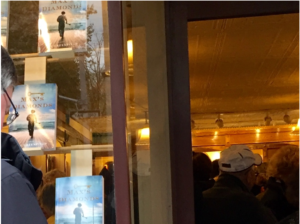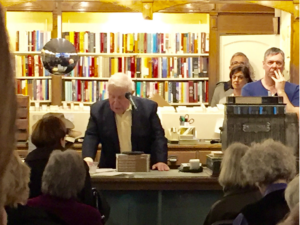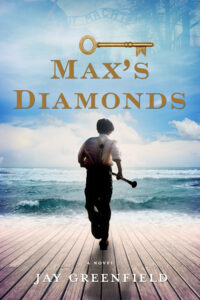Claudia Palmira
Posts by Claudia Palmira:
An Interview with Jay Greenfield, author of Max’s Diamonds
Jay Greenfield, author of Max’s Diamonds (Chickadee Prince Books, 2016), is a first time novelist at the age of 83.
Interviewed by his editor, David Groff.
Groff: Like your protagonist Paul, you grew up in Rockaway, and you became an attorney. But how did the story of a boy who was haunted by the Holocaust become central to this novel, which is filled with ambition and love and very hard moral choices?
Greenfield: The poorer Jews in Rockaway lived in Arverne, where I grew up. The town is dead eight months of the year, and it starts to come to life in June. Stores that are closed for months and months open. Almost all of them tend to be near the beach, including some on the boardwalk, which had a very vibrant life both day and night, during the summer. In 1947 or 1948, there were a lot of immigrants and first-generation Jews. I was working then in a grocery store about two blocks from the boardwalk, and I can remember a short, squat man hauling hundred pound bags of kasha, buckwheat or groats. The guy had numbers on his arm, and I wanted to know about it. But of course, I wasn’t going to talk to him, because I was afraid of him. I was afraid of what he’d say, afraid that his experiences made him different from other people, which in fact they did. So I was intrigued with the numbers, and I was probably too much intrigued with anti-Semitism and with the Holocaust. The feeling that there were people, even if they’re thousands of miles away, who want to kill you–that gets to you.
Paul has a cousin, Max, a Holocaust survivor who shares his bedroom as a boy. Max transforms Paul’s life, and Paul is haunted by him. What is the significance of Max—and his diamonds?
Max is a Jew who suffered in the Holocaust, but he found a way to benefit from it, and the knowledge of that destroys him. But first, Max manages to pass along more than a little of that pain and guilt to Paul. You know, for the Jews, the Holocaust represents more than just suffering – it also involved a lot of guilt and shame.
Was there anyone like that in your life, or in your family?
I had a distant cousin, a woman, who had a baby during the Holocaust. I thought, who the hell was the father? And could the father have been a Nazi? I thought that maybe nice people didn’t survive.
You were, at an early age, connected with your Jewish identity, whereas Paul, in the novel, spends a lot of time running from it as he becomes a lawyer at a WASPish firm.
It’s partly because he wants to get away from his family, and partly because he knows where the power is. It’s not with the Jews, you know. When Paul almost totally abandons his Judaism, he has to build a whole new life, and when he jumps into the WASP world, he does so with a great deal of success. Paul has no end of opportunities in what we used to call “white firms.”
There was a great wave of Jews who assimilated, often forsaking their Jewishness.
Maybe I was afraid of doing that. You don’t learn much in Hebrew School, but the one thing you learn is Jews have been persecuted, and you learn it six days a week. I can only quote Max. “You beat the goyim at their own game.” That’s Max’s message.
You are publishing your first novel in your 80s. Do you think that there are advantages to being an older writer rather than a 21-year-old wunderkind?
The biggest advantage for me in starting a writing career at this age is that I don’t care what anybody thinks. Whatever I was supposed to do in life, I’ve done it, I’ve enjoyed it, I’m pleased with it. The wife of Simon H. Rifkind, who was really a great lawyer, the guy who was essentially the head of my firm, a man with very nineteenth century values, his wife once said, “I’m so old I don’t care what headwaiters think.” I’ve lived 83 years. I’m as full of crap now as I was 30 years ago.
Are there drawbacks to being older and to doing this?
Yes, yes. I’ve got to get done before I leave. At my age you know, as virtually anyone my age knows, your mental faculties aren’t what they used to be. But then again, they never were. I view death as “I’ve got to finish this damn novel before…” It’s called zetsfleisch. Just to sit on your ass and do not move until you get it done.
Which writers do you particularly admire or emulate?
Marilynne Robinson, I think, is just overwhelming. Philip Roth comes from exactly the same kind of background that I do, but I find him terrifying. One, because he’s so damn good, and he’s so damn funny. But, two, because he mocks and essentially rejects much about Judaism.
Paul is challenged by the existence and the legacy of Israel. What is your own relationship with Israel?
Paul can’t stand the thought that Israel might be destroyed. It is so terrifying to him that later in his story, he actually goes out and gives the United Jewish Appeal half his net worth. I tended to idealize Israel for a long, long time. This to me centered around the idea of Jews fighting and winning. But there’s nothing like Bibi Netanyahu to bring you back to reality.
Why does the idea of Jews fighting and winning have such emotional power for you?
I think because I was ashamed of the image of Jews when I was growing up. I was ashamed by much of Jewish humor, which tends to emphasize the lack of physical prowess and being shrewd. Have you heard the phrase yiddishe kopf? It literally means “Yiddish Head.” At best it means common sense or intelligence, but very often it means sleaziness. A lot of these phrases that Jews use to describe Jews are not very nice at all.
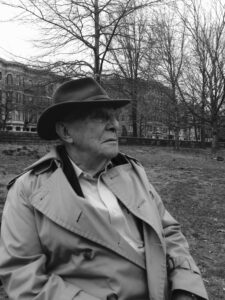
What fiction are you working on now?
My new book starts in Arverne and ends up in the Deep South. It’s about the relationship largely of Jews and Blacks, about a Jew growing up in a world where he knows that Blacks are at a disadvantage, and in many ways, he doesn’t like Blacks. The novel explores the complex history between two different oppressed minorities in America—how they contended with each other, and how they were allies.
Let’s talk about your experience in the Civil Rights Movement.
My older brother had been a Communist, fighting and dying in the Abraham Lincoln Brigade in the Spanish Civil War. My civil rights activity arose from my admiration for my brother and my terror at what happened to him. In 1960, I was in my last year of law school, and I would watch on television Black people my age, or maybe a little bit younger even, sitting at segregated lunch counters and maintaining their dignity, and dealing with this incredible violence. I felt I had to live up to my brother. No, I couldn’t live up to my brother, because if you lived up to him you died. But I had to try, and it just seemed to be common sense to me that Jews should join with Black people to picket the Woolworth’s in Harvard Square, and I put an enormous amount of effort into that, and I guess it was successful.
I ended up being part of Freedom Summer, because how could you not be? I went south to be a lawyer, because that’s what I am, and that’s what I do best, and that’s what they needed. Three days after the 1964 Civil Rights Act became law, I obtained an order requiring a segregated restaurant in the deep South to serve Blacks; it was the first such order in an action brought by victims of discrimination. The restaurant was in New Roads, Louisiana, and my pictures was in papers throughout the state. I received death threats. I went South for three years—and I have talked for fifty years about it.
You were indeed an activist.
I had two days of fame. But my two days of fame got me a lot of enemies.
Max’s Diamonds is available for pre-order on Amazon or your local bookstore.
An Interview with Jay Greenfield, author of Max’s Diamonds
Jay Greenfield, author of Max’s Diamonds (Chickadee Prince Books, 2016), is a first time novelist at the age of 83.
Interviewed by his editor, David Groff.
Groff: Like your protagonist Paul, you grew up in Rockaway, and you became an attorney. But how did the story of a boy who was haunted by the Holocaust become central to this novel, which is filled with ambition and love and very hard moral choices?
Greenfield: The poorer Jews in Rockaway lived in Arverne, where I grew up. The town is dead eight months of the year, and it starts to come to life in June. Stores that are closed for months and months open. Almost all of them tend to be near the beach, including some on the boardwalk, which had a very vibrant life both day and night, during the summer. In 1947 or 1948, there were a lot of immigrants and first-generation Jews. I was working then in a grocery store about two blocks from the boardwalk, and I can remember a short, squat man hauling hundred pound bags of kasha, buckwheat or groats. The guy had numbers on his arm, and I wanted to know about it. But of course, I wasn’t going to talk to him, because I was afraid of him. I was afraid of what he’d say, afraid that his experiences made him different from other people, which in fact they did. So I was intrigued with the numbers, and I was probably too much intrigued with anti-Semitism and with the Holocaust. The feeling that there were people, even if they’re thousands of miles away, who want to kill you–that gets to you.
Paul has a cousin, Max, a Holocaust survivor who shares his bedroom as a boy. Max transforms Paul’s life, and Paul is haunted by him. What is the significance of Max—and his diamonds?
Max is a Jew who suffered in the Holocaust, but he found a way to benefit from it, and the knowledge of that destroys him. But first, Max manages to pass along more than a little of that pain and guilt to Paul. You know, for the Jews, the Holocaust represents more than just suffering – it also involved a lot of guilt and shame.
Was there anyone like that in your life, or in your family?
I had a distant cousin, a woman, who had a baby during the Holocaust. I thought, who the hell was the father? And could the father have been a Nazi? I thought that maybe nice people didn’t survive.
You were, at an early age, connected with your Jewish identity, whereas Paul, in the novel, spends a lot of time running from it as he becomes a lawyer at a WASPish firm.
It’s partly because he wants to get away from his family, and partly because he knows where the power is. It’s not with the Jews, you know. When Paul almost totally abandons his Judaism, he has to build a whole new life, and when he jumps into the WASP world, he does so with a great deal of success. Paul has no end of opportunities in what we used to call “white firms.”
There was a great wave of Jews who assimilated, often forsaking their Jewishness.
Maybe I was afraid of doing that. You don’t learn much in Hebrew School, but the one thing you learn is Jews have been persecuted, and you learn it six days a week. I can only quote Max. “You beat the goyim at their own game.” That’s Max’s message.
You are publishing your first novel in your 80s. Do you think that there are advantages to being an older writer rather than a 21-year-old wunderkind?
The biggest advantage for me in starting a writing career at this age is that I don’t care what anybody thinks. Whatever I was supposed to do in life, I’ve done it, I’ve enjoyed it, I’m pleased with it. The wife of Simon H. Rifkind, who was really a great lawyer, the guy who was essentially the head of my firm, a man with very nineteenth century values, his wife once said, “I’m so old I don’t care what headwaiters think.” I’ve lived 83 years. I’m as full of crap now as I was 30 years ago.
Are there drawbacks to being older and to doing this?
Yes, yes. I’ve got to get done before I leave. At my age you know, as virtually anyone my age knows, your mental faculties aren’t what they used to be. But then again, they never were. I view death as “I’ve got to finish this damn novel before…” It’s called zetsfleisch. Just to sit on your ass and do not move until you get it done.
Which writers do you particularly admire or emulate?
Marilynne Robinson, I think, is just overwhelming. Philip Roth comes from exactly the same kind of background that I do, but I find him terrifying. One, because he’s so damn good, and he’s so damn funny. But, two, because he mocks and essentially rejects much about Judaism.
Paul is challenged by the existence and the legacy of Israel. What is your own relationship with Israel?
Paul can’t stand the thought that Israel might be destroyed. It is so terrifying to him that later in his story, he actually goes out and gives the United Jewish Appeal half his net worth. I tended to idealize Israel for a long, long time. This to me centered around the idea of Jews fighting and winning. But there’s nothing like Bibi Netanyahu to bring you back to reality.
Why does the idea of Jews fighting and winning have such emotional power for you?
I think because I was ashamed of the image of Jews when I was growing up. I was ashamed by much of Jewish humor, which tends to emphasize the lack of physical prowess and being shrewd. Have you heard the phrase yiddishe kopf? It literally means “Yiddish Head.” At best it means common sense or intelligence, but very often it means sleaziness. A lot of these phrases that Jews use to describe Jews are not very nice at all.

What fiction are you working on now?
My new book starts in Arverne and ends up in the Deep South. It’s about the relationship largely of Jews and Blacks, about a Jew growing up in a world where he knows that Blacks are at a disadvantage, and in many ways, he doesn’t like Blacks. The novel explores the complex history between two different oppressed minorities in America—how they contended with each other, and how they were allies.
Let’s talk about your experience in the Civil Rights Movement.
My older brother had been a Communist, fighting and dying in the Abraham Lincoln Brigade in the Spanish Civil War. My civil rights activity arose from my admiration for my brother and my terror at what happened to him. In 1960, I was in my last year of law school, and I would watch on television Black people my age, or maybe a little bit younger even, sitting at segregated lunch counters and maintaining their dignity, and dealing with this incredible violence. I felt I had to live up to my brother. No, I couldn’t live up to my brother, because if you lived up to him you died. But I had to try, and it just seemed to be common sense to me that Jews should join with Black people to picket the Woolworth’s in Harvard Square, and I put an enormous amount of effort into that, and I guess it was successful.
I ended up being part of Freedom Summer, because how could you not be? I went south to be a lawyer, because that’s what I am, and that’s what I do best, and that’s what they needed. Three days after the 1964 Civil Rights Act became law, I obtained an order requiring a segregated restaurant in the deep South to serve Blacks; it was the first such order in an action brought by victims of discrimination. The restaurant was in New Roads, Louisiana, and my pictures was in papers throughout the state. I received death threats. I went South for three years—and I have talked for fifty years about it.
You were indeed an activist.
I had two days of fame. But my two days of fame got me a lot of enemies.
Max’s Diamonds is available for pre-order on Amazon or your local bookstore.
“Max’s Diamonds” by Jay Greenfield— Identity, Culpability and Loss
Another fine review of Max’s Diamonds, from Amos Lassen:
Jay Greenfield tells us the story of a man who hides his past and that includes a very traumatic childhood. The themes of secrets and lies show the grief that Paul deals with on an almost daily basis. He was unable to stop thinking about the numbers that he saw tattooed on Max’s arm. Even with this, Paul is able to succeed educationally, professionally and socially. We meet fascinating characters that are drawn not only as colorful but with flaws yet we can easily relate to them. There were moments that I could see these characters standing in front of me and acting out the roles they play in the book. Greenfield’s prose, along with his plot, draw us into the novel as we read about religious persecution, guilt and relationships built on lies. I found that more than anything else, the novel made me think and that is what I see as the true purpose of literature.
Read the full review here.
“Everything is connected … in a pointless and ridiculous way.”
An interview with Alon Preiss, the author of A Flash of Blue Sky, published by Chickadee Prince Books on March 1, 2016.
Chickadee Prince Books: Congratulations on publishing your book, at long last.
Preiss: Other web interviews just send out questions, and I can type out clever answers. It makes me sound smarter. And I don’t have to talk to anyone. I am not very sociable.
Most books set in the 1980s by U.S. authors have a narrow focus. But yours doesn’t.
The things that were happening in America during the 1980s had an effect around the globe. It wouldn’t be honest to satirize the 1980s and focus on some broker-dealer rep in a club in New York snorting cocaine.
Your novel follows a number of characters from the 1980s through the 1990s, all around the world. They rise in their careers, fall in and out of love, and they have an outsize impact on world history, without ever knowing it.
Everything has an impact on something else, and history is the result of random and forgotten and trivial events. So if a man decides to marry some woman, instead of some other woman, that could mean one war will end, and another war will commence. That’s just a scientific fact. Life and history is really very pointless and ridiculous. Absent some hanky panky in the 1988 presidential election on the Democratic side, there would have been no first President Bush, no W., no war in Iraq. Just because someone’s wife was out of town. Think of all the people who died in World War I because the Archduke’s driver made a wrong turn. And then the Kaiser’s humiliation in World War I led to the rise of Hitler, which led to the Holocaust and the murder of six million Jews and millions of others. All because a chauffeur made a wrong turn.
World War I would have happened anyway.
But you don’t know that. I think many people died and many wives and mothers had their hearts broken just because a fellow took a wrong turn. So everything is connected, and not in a good and meaningful way – in a pointless and ridiculous way. That’s really the message of the book more than anything.
Kirkus says your book is about the fall of Communism.
Well, that sounds very smart, doesn’t it? It’s not about the fall of Communism. It’s just about the 1980s. Communism is a nice metaphor for life itself – everything about it sounds perfect, and whatever and whomever we really believe in will inevitably let us down. So if the book is about the fall of Communism, it’s really also about the death of Love and the end of Hope.
What about Joren, the mysterious, sort of ageless and mysterious figure? Hasn’t he loved Susan for a couple of thousand years?
Maybe yes. Or maybe he’s just nuts. Or she is. Maybe, like ideal romance – which he represents – he doesn’t exist. But if he has loved her for a couple of thousand years, what has it gotten him?
But it is also filled with humor. Daniel’s quest for enlightenment, for example.
Thank you. It happens to everyone eventually; in this case a lawyer who has basically chosen the route of corruption suddenly realizes that he is going to die, and he starts investigating spirituality, years after rejecting his Jewish roots. It amounts to pleading for his life before an entity that he has never believed in. There is this sense that if we believe in something deeply enough – God, eternal life, or even our own potential for success – it will come true. Have faith! If you believe in yourself, you will never fail! You know. But having deep faith in something will not make it real if it isn’t real, whether it is God or our own talents. Maybe you are talented. Maybe there is something out there. But our own belief cannot impact it. We are powerless. Our predicament as humans is quite funny and ridiculous, by its nature. We’re given potential and possibility, and all of that, and what does it amount to?
The book ends quite romantically.
A couple reunited in old age? You have to wonder about their wasted lives.
Your book is political, but it’s hard to tell where you stand.
I am a card-carrying member of the pessimist party.

A Flash of Blue Sky is available for pre-order at your local bookstore, or on Amazon or any website. Click here to order on Amazon.
RAVE REVIEWS FOR CHICKADEE PRINCE!
On March 1, Chickadee Prince Books is publishing A Flash of Blue Sky by Alon Preiss. Today, Kirkus published the first review of the book, and it’s a good one.
A Flash of Blue Sky is available for pre-order at your local bookstore, or on Amazon or any website. Click here to order on Amazon.
“Preiss sets his creative sights high in his inaugural effort, conjuring a dizzying array of characters around the globe. A complex literary drama that’s heavy on symbolism and existential angst, [with] a lively sense of humor.”
Click here to read the full review.
On May 1, Chickadee Prince Books will follow that up with Max’s Diamonds by Jay Greenfield, a multi-decade post-War saga, which Foreword Reviews calls “an excellent new work of fiction.”
And please support independent publishing!
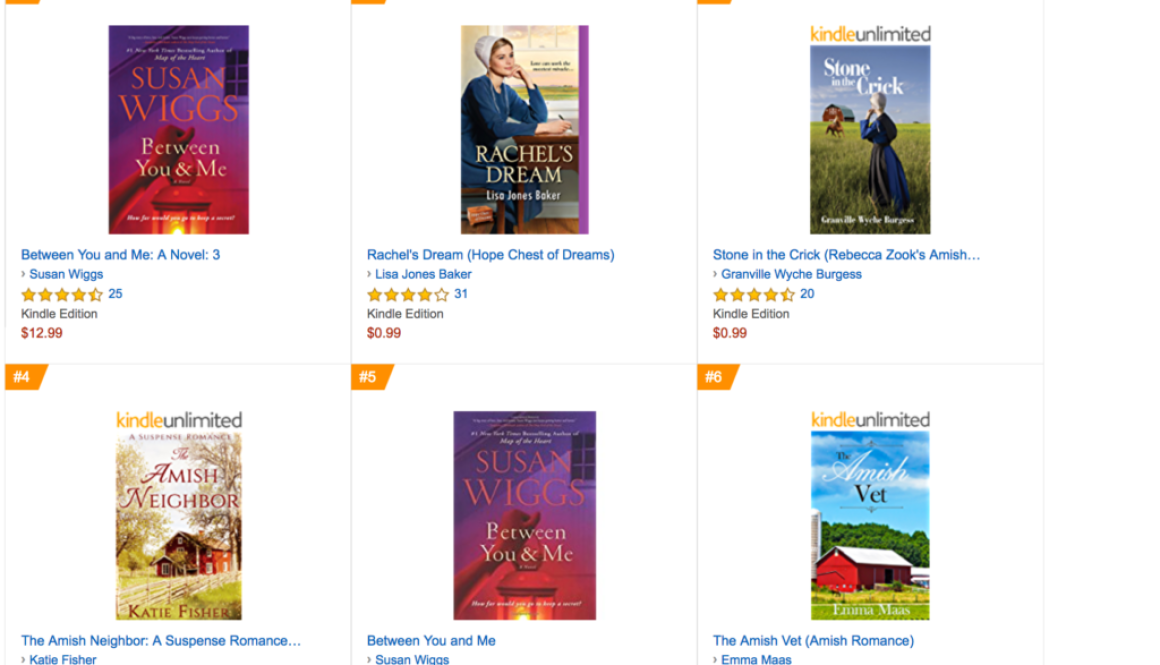
Max’s Diamonds and A Flash of Blue Sky – Coming this Spring
Two new great popular novels from Chickadee Prince Books –
